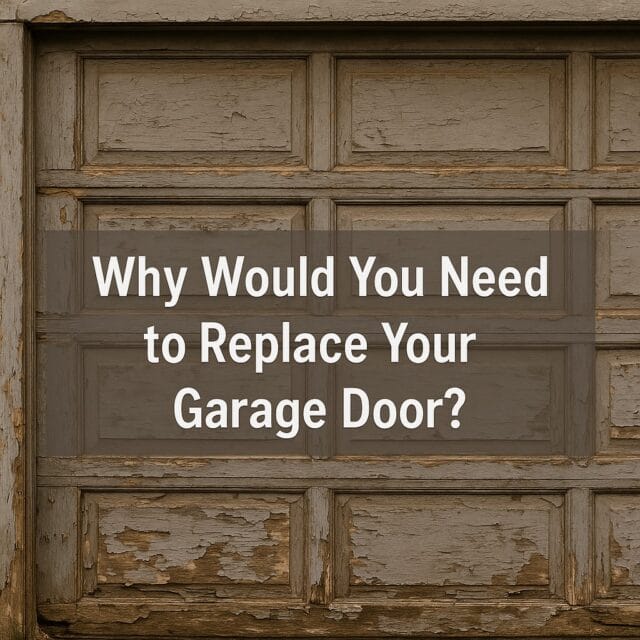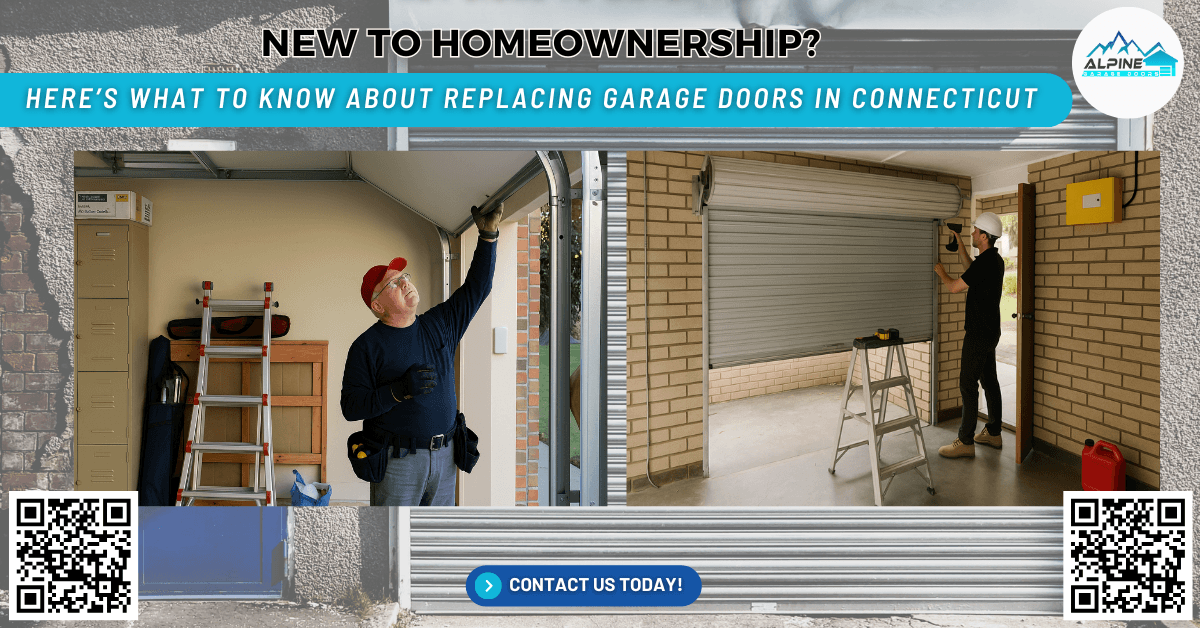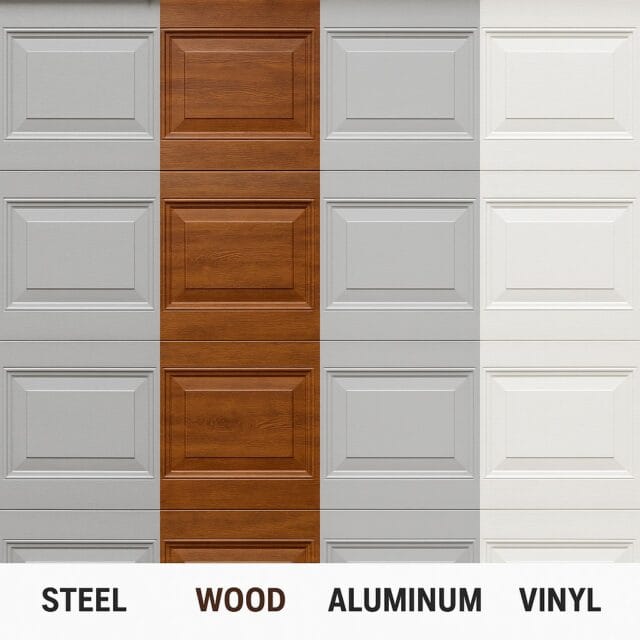When Maria and James moved into their new home in Hartford, Connecticut, they were thrilled to finally enjoy the perks of homeownership. However, their excitement was short-lived when the garage door started making strange grinding sounds. Within a few weeks, the garage door opener gave out entirely. Upon inspection, a professional determined that their garage door panels, hinges, and torsion springs were significantly worn, making replacement the safest option. For many new homeowners like Maria and James, learning about garage door systems and knowing when to replace them is a vital first step in home upkeep.
Replacing garage door is one of the best investments you can make as a homeowner. According to the 2024 Remodeling Cost vs. Value Report, homeowners can recoup over 93% of the cost of a new garage door in increased home value. Not only does a new door improve curb appeal, but it also ensures proper operation, better security, and energy-efficient performance throughout the year.
As a new homeowner in Connecticut, you might not yet realize how essential a smooth-functioning garage door is. It’s not just an entry point; it’s a vital component that affects your home’s energy conservation, security, and visual appeal. Understanding the garage door replacement process can help you make informed decisions, avoid costly mistakes, and ensure safe operation of your system.
Why Would You Need to Replace Your Garage Door?

Garage doors endure a great deal of stress through daily use. Over time, the strain on tracks, brackets, springs, and hinges can lead to serious wear and tear. Here are some common signs that indicate it’s time to replace your garage door:
1. Unusual Noises or Vibration During Operation
If your garage door squeals, rattles, or shakes during operation, it could mean loose screws, worn rollers, or a failing garage door opener. These issues might point to deeper problems with the garage door track, cable system, or torsion springs.
2. Visible Damage or Warping
Garage door panels, especially those made from wood, can warp or crack over time due to Connecticut’s humidity and winter temperatures. Broken brackets, corroded bolts, or compromised insulation can significantly reduce the effectiveness and safety of the door.
3. Outdated or Inefficient Design
Old garage doors often lack proper insulation and energy efficiency. Newer models include high R-values and better weather stripping to help conserve energy, especially if your garage is attached to your home.
4. Safety and Security Concerns
Older doors may not include modern safety features like auto-reverse sensors or smart garage door opener technology. These features are crucial for safe operation and protecting your family and property.
5. Frequent Repairs and Maintenance
If you constantly find yourself replacing cables, tightening bolts, or adjusting the tracks with a power drill and vise grip, it might be time for a complete replacement. Consistent repairs usually indicate deeper structural issues.
What Are Your Garage Door Replacement Options?
Choosing the right garage door involves more than just selecting a color. Here are the key components and options you’ll encounter:
Material Types
- Steel: The most durable and low-maintenance option. Steel doors resist dents and weather damage.
- Wood: Offers rich, aesthetic appeal but requires regular upkeep to prevent warping and rotting.
- Aluminum and Glass: Ideal for modern homes, they’re lightweight and rust-resistant.
- Vinyl: Dent-resistant and great for humid environments like coastal Connecticut towns.

Insulation Levels
Choosing insulated garage doors with high R-values can help regulate temperature and conserve energy.
- Single-Layer Doors: Basic protection, no insulation.
- Double-Layer (Polystyrene): Provides decent insulation.
- Triple-Layer (Polyurethane): Offers the best insulation, soundproofing, and energy efficiency.
Design Options
- Raised Panel: A timeless look that fits most Connecticut homes.
- Carriage Style: Mimics the old-world barn style; adds curb appeal.
- Modern Glass: Ideal for homeowners seeking a sleek, contemporary finish.
What to Consider Before Replacing Garage Doors in Connecticut
Climate and Weather
Connecticut winters are harsh. Look for doors with reinforced insulation, sealed bottom panels, and rust-resistant hardware to maintain energy efficiency and structural integrity.
Building Codes and HOA Regulations
Many neighborhoods have specific rules for exterior home modifications. Check local codes or consult a professional garage door service to ensure compliance.
Garage Door Size and Dimensions
Every garage opening is different. Accurate measurement of the width, height, and garage header is vital for a perfect fit and smooth operation.
Smart Features and Safety Tech
New garage doors come with Wi-Fi-enabled openers, LED lights, and built-in cameras. Safety features include motion sensors, auto-reverse mechanisms, and tamper-proof brackets.
DIY vs. Professional Installation
Installing a new garage door isn’t as simple as drilling some bolts and screwing panels in place. It involves precise alignment of tracks, secure placement of brackets, correct tensioning of torsion springs, and careful attachment of hinges.
Risks of DIY Installation
- Injury from mishandling heavy panels or spring-loaded components.
- Improper installation is affecting the balance and operation.
- Voiding product warranties due to non-certified work.
Benefits of Professional Installation
- Ensures each garage door section, from the bottom panel to the top section, is aligned properly.
- Trained technicians use the necessary tools, like a power drill, tension rods, and safety equipment.
- Quick, clean installation and safe operation testing.
Cost Breakdown: What to Expect When Replacing Garage Doors
Prices vary depending on material, size, insulation, and additional features like smart openers or custom designs. Here’s a breakdown:
- Basic Steel Single-Car Door: $800–$1,200
- Double Insulated Door with Opener: $1,500–$2,500
- Custom Wood or High-End Glass Door: $3,000+
Other cost factors:
- Installation labor
- Removal and disposal of the old door
- New opener system, hinges, brackets, and track
Maintenance packages for yearly upkeep
Investing in a professional garage door with proper insulation, safety, and energy-efficient features saves time and money in the long run.
Common Garage Door Issues New Homeowners Encounter
Torsion Spring Breakage
This is one of the most common issues. Torsion springs are under immense pressure and should never be adjusted without proper tools.
Garage Door Opener Failures
Old or incompatible openers can fail due to worn gears or poor wiring. Replacing them ensures better security and functionality.
Track and Roller Misalignment
Improperly aligned horizontal and vertical tracks can cause jerky movement, grinding sounds, and wear on garage door panels.
Bracket and Hinge Fatigue
Constant opening and closing can loosen brackets and damage hinges, leading to dangerous operation and loud noises.
Weather Damage and Rust
Moisture and salt can corrode bolts, screws, and metal panels. Regular maintenance and choosing the right materials help prevent this.
How Can Alpine Garage Doors New England Help You?
At Alpine Garage Doors New England, we understand the unique needs of new homeowners. Whether you’re replacing a garage door to boost curb appeal, increase security, or improve energy efficiency, we’re here to help every step of the way.
Our trained technicians offer a comprehensive range of services, including:
- Residential and commercial garage door installation
- Smart garage door opener upgrades
- Spring and cable replacement
- Maintenance and safety inspections
- Custom garage door solutions tailored to your home
We bring years of experience working with Connecticut’s climate, building codes, and homeowner expectations. Our expert service ensures that your garage door installation process is smooth, safe, and successful.
Call us today for a free consultation!
📍 Address: 150 Cross St, Boston, MA 02109
📞 Phone: (617)-865-7222
Let Alpine Garage Doors New England help you protect your investment, enhance your home’s aesthetic appeal, and enjoy the security and convenience of a professionally installed garage door.
Frequently Asked Questions
How long does it take to replace a garage door?
Most garage door replacements can be completed within 3 to 5 hours by professional technicians.
Do I need to be home during the garage door replacement?
While not mandatory, it’s helpful to be available for access and to discuss specific preferences or concerns with the installer.
What type of maintenance is required after installing a new garage door?
Regular lubrication of moving parts, checking spring tension, and inspecting the opener system every 6 months will keep it running smoothly.
Can I reuse my existing garage door opener with a new door?
In many cases, yes, but it depends on compatibility with the new door’s weight and safety systems; your installer can advise you.


